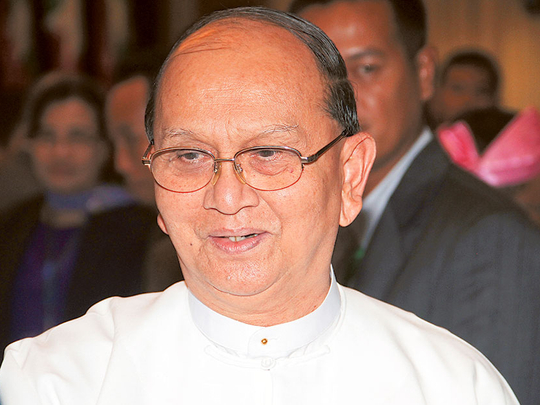
Yangon: Myanmar’s president on Tuesday signed a draft national ceasefire with armed rebel groups that the UN hailed as a “historic and significant achievement” as the country tries to end decades of civil war.
Reformist leader Thein Sein, who has placed a national ceasefire agreement at the heart of efforts to shake off the legacy of military rule, said an end to the fighting was within reach — even though unrest continues in northern border areas.
“The people need peace, they desire peace and they expect peace,” he told representatives of 16 major ethnic minority armed groups at the draft signing ceremony in Yangon on Tuesday, adding that a full agreement could be inked in months.
“After that is signed, the road is open for political dialogue. This action will ensure the peace builders a place in Myanmar’s history,” he said at the gathering.
His surprise appearance came after a breakthrough in talks was announced on Monday, with representatives from the rebels, army and government agreeing a tentative deal that sets out a framework for a countrywide ceasefire.
But the draft will only be officially signed after a conference of the ethnic armed groups, for which no date has so far been set.
Negotiators said some of the more contentious points had been excised from the agreement, in a move likely to have enabled the draft to be accepted.
The UN, which has acted as an observer to months of peace negotiations, said the tentative deal was a “milestone” for the former junta-run nation, which has grappled with some of the world’s longest-running civil wars.
“For the government of Myanmar and 16 Ethnic Armed Groups to reach a ceasefire agreement after more than sixty years of conflict is a historic and significant achievement,” it said in a statement on behalf of UN Special Adviser Vijay Nambiar.
The statement added that there remain “many concerns and difficulties” on the ground. But the ability of negotiators to find enough common ground to produce the draft text showed “new levels of trust, confidence and cooperation are possible between former enemies and that the seeds of change in Myanmar are beginning to sprout”.
Myanmar has been racked by unrest since independence from Britain in 1948 as insurgencies flared among minority groups demanding greater autonomy. Conflicts were fuelled in part by tussles over the country’s rich natural resources.
Thein Sein’s quasi-civilian government, which took power in 2011 after 49 years of army rule, has pushed for a ceasefire with the country’s multiple armed groups before campaigning begins for a crucial general election expected in November.
But heavy fighting has continued in Myanmar’s northern Kachin and Shan states, overshadowing the peace efforts.
Lengthy negotiations have also stumbled on a range of thorny issues, including lingering distrust of the still powerful army and tussles over the concept of a federal military.
Renewed unrest in the Kokang region of Shan state erupted in February and shook relations with Beijing as tens of thousands fled across the border into China to escape heavy fighting.
Myanmar has reached individual ceasefires with 14 of the 16 major armed ethnic groups.
But deals have so far proved elusive with the Ta’ang National Liberation Army in Shan state, which is fighting alongside the Kokang rebels, as well as the Kachin Independence Army.
The Kokang rebels, who spilt back into Myanmar in February after being driven out by the army in 2009, are not directly involved in the peace talks.
But the ethnic armed group negotiators are pushing for the fighting to be part of future dialogue.












